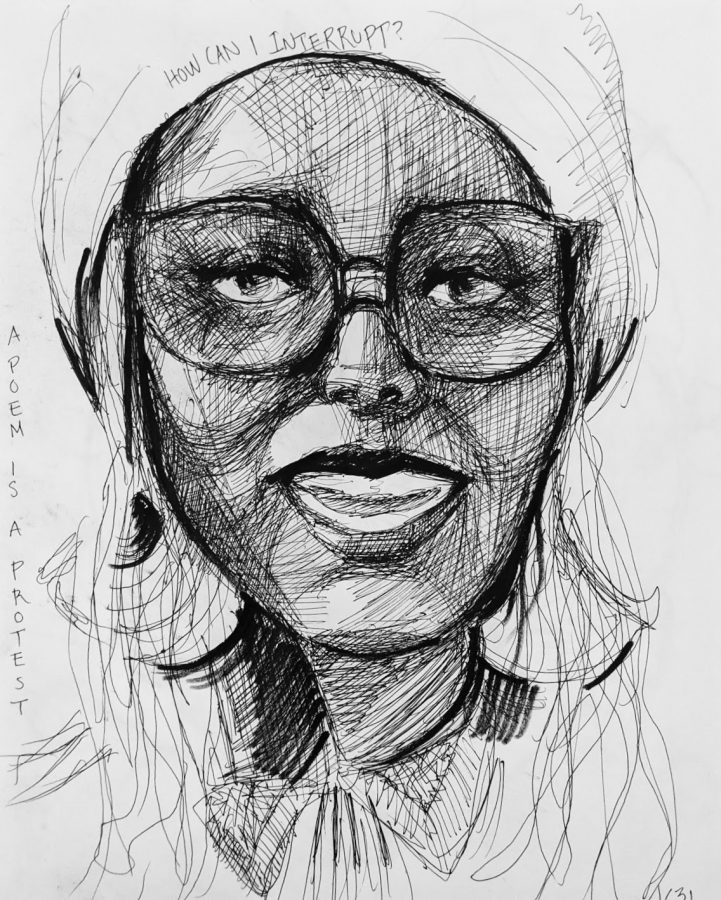When words transcend the Zoom screen
February 5, 2021
Mwende Katwiwa, better known as their stage name FreeQuency, spoke in January to Linfield University students. It was epic.
Katwiwa is a Kenyan, immigrant, and queer womxn storyteller. On Friday, January 19, the Wildcat Events Board (WEB) hosted a Zoom event where Katwiwa shared anecdotes, witty commentary on the state of the nation, and their personal definition of freedom.
As is characteristic of virtual events, the majority of viewers had their Zoom cameras off. I felt empathy for FreeQuency as they prepared to read their first poem in front of a faceless audience. Nevertheless, Katwiwa began to speak.
Almost immediately, I found myself nodding along to FreeQuency’s musical cadence and clever stanzas.
“Sometimes the rot is so deep in the root that pruning does not breed possibility,” they said.
At the time, I was completing a drawing assignment while simultaneously processing the intense week we’d all just experienced. When Katwiwa spoke, I put my pen down. They finished as clapping emojis erupted on the screen. I turned on my camera and smiled.
I know that I was not the only one entranced by the spoken word of FreeQuency. One cannot help but listen to their unwavering voice speak truth with confidence and elegance.
I abandoned my drawing assignment and decided to draw FreeQuency instead.
Katwiwa responded to the poem “I Don’t Want a Dyke for President” by Zoe Leonard in their poem “1-45 have lied, 46-100 will be no different” for the 45 Lies project: “I pledge no allegiance to America because white men defiled it with borders and called the result a country. I do not confuse dying to vote with dying for freedom even though they meant the same thing at one time in history.”
Next, FreeQuency read a piece about their mother. The poem was intimate and intense, and I felt honored to be a part of the audience for such a vulnerable poem.
The longing and love expressed sparked an acute homesickness in myself as an audience member. I imagine that the same was true for the rest of the viewers.
Between poems, Katwiwa engaged in relaxed conversation. They described their history as an organizer for Tulane University in New Orleans and shared the miraculous moment when they and a group of fellow organizers acted quickly to prevent the arrest of a black youth.
Curious, I unmuted and asked FreeQuency to share more about what an organizer is and what they do. Jokingly, they told us that they didn’t know how much of a part of their identity it was until they tried to stop organizing. Central to organizing, according to FreeQuency, is asking the question: “How can I interrupt?”
For FreeQuency, this necessary interruption often takes the form of poetry.
They proudly showed us their self-designed stickers with the words “A Poem is a Protest” in bold. This mantra guides Katwiwa through meditation, writing, and taking action within the Black Lives Matter movement and in local activism.
In the Zoom chat, FreeQuency sent a link to a fundraiser they established for black communities in New Orleans, using their connections with Tulane alumni to gather donations.
After their last poem, Katwiwa left me to reflect on how I can adopt the role of an organizer on a local level. What needs “interrupting” in my community? How can I use my voice or my art, like FreeQuency, to direct attention to problems I care about?
I strongly encourage readers to listen to Katwiwa’s spoken word performances available on their website, freequencyspeaks.com, in order to understand how “A Poem is a Protest.”
Other links:

